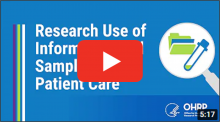Research Participants
Research involving human subjects is based on a commitment to advance human welfare, knowledge and understanding, and to examine cultural dynamics. Researchers, universities, governments and private institutions undertake or fund research involving human subjects for many reasons: for example, to alleviate human suffering, to validate social or scientific theories, to dispel ignorance, to analyze policy, and to understand human behavior and the evolving human condition. [Interagency Advisory Panel on Research Ethics]
Someday, you or a family member may want to take part in a research study. If this happens, the information here may help you make the right decision.

UK Center for Clinical and Translational Science (CCTS) Guidance for Research Participants During COVID-19 [HTML]
Information About Participating in Research
- University of Kentucky (UK) Center for Clinical and Translational Science (CCTS) -
- About Research Participation (U.S. Department of Health and Human Services (DHHS))
- "Are You Thinking About Being in a Research Study?" (Collaborative Institutional Training Initiative (CITI) module) includes:
- What are the types of research that include human subjects?
- What are my rights as a human subject?
- What questions should I ask before I decide about being a human subject?
- What is the informed consent process?
- What is expected of you after you have said 'yes' to being a human subject?
- Who protects people who agree to be research subjects
- Definitions of Commonly Used Terms (Collaborative Institutional Training Initiative (CITI) "Are You Thinking About Being in a Research Study?" module)
- Center for Information & Study on Clinical Research Participation (CISCRP) - a non-profit organization focused on educating and informing the public about clinical research participation)
- Advice to Legally Authorized Representatives of Adult Participants in Medical Research [PDF]
- Advice to Legally Authorized Representatives of Adult Participants in Nonmedical Research [PDF]
- National Cancer Institute (NCI) Tissue Donation video
- Patient Resources (CenterWatch)
- What Does Randomization Mean for Research Volunteers? (DHHS)[YouTube Video]
- Participating in Social & Behavioral Health Research (DHHS) [YouTube Video]
What is a Clinical Trial?
A clinical trial (also clinical research) is a research study in human volunteers to answer specific health questions. Carefully conducted clinical trials are the fastest and safest way to find treatments that work in people and ways to improve health. Interventional trials determine whether experimental treatments or new ways of using known therapies are safe and effective under controlled environments. Observational trials address health issues in large groups of people or populations in natural settings.
More clinical trial information:
- University of Kentucky (UK) Center for Clinical and Translational Science (CCTS) -
- National Institutes of Health (NIH) - Clinical Research Trials and You
- National Cancer Institute (NCI) - Clinical Trials Questions and Answers for Prospective Participants
- National Institutes of Health (NIH) ClinicalTrials.gov - Learn About Clinical Studies
Regulations to Protect Research Volunteers (OHRP)
Learn about the regulations that protect research volunteers, why we have them, and who enforces them.
- Why Have Regulations to Protect Research Participants? [HTML]
- What Regulations Protect Research Participants? [HTML]
- Who Oversees the Regulations to Protect Research Participants? [HTML]
- Is All Human Subjects Research Regulated? [HTML]
- Who is Responsible for Protecting Human Subjects in Research? [HTML]
For Parents and Kids
- Children's Hospital Boston Clinical Trials
- What is Medical Research? (Comic Book) [PDF]
- The Kids Files Page (NIH) – Features the Video Game The Paper Kingdom
- Would Your Child Benefit from a Clinical Trial? (FDA)
- Special Protections for Children as Research Subjects (Office for Human Research Protections (OHRP))
- For Parents and Children (NIH)
Información sobre la investigación - en Español
- Ser Voluntario en Estudios Clínicos: Es Su Decisión
- Consejos para representantes legalmente autorizados de los participantes adultos - Médica investigación [PDF]
- Consejos para representantes legalmente autorizados de los participantes adultos - Comportamiento y ciencias sociales investigación [PDF]
- Acerca de La Participación en Las Investigaciones Científicas (La Oficina de Protecciones para la Investigación Humana (OHRP, en inglés))
- Participando en Investigaciones Sociales y de Conducta Relacionadas a la Salud (DHHS) [YouTube]
Ensayos Clínicos
- Introducción a los ensayos clínicos (Institutos Nacionales de la Salud (NIH))
- Ensayos clínicos tutorial interactivo (NIH)
- Estudios Clínicos: Preguntas y respuestas (FDA)
Para Los Padres
Reglamentos para la protección de personas que participan en investigaciones científicas
Oficina de Protecciones para la Investigación Humana (OHRP)
Aprenda acerca de los reglamentos que protegen a aquellos que participan en investigaciones científicas, por qué tenemos dichos reglamentos, y quién los hace cumplir. Este material fue diseñado para el uso público, y le invitamos a que lo comparta o distribuya libremente.
-
¿Por qué tenemos reglamentos para proteger a las personas que participan en investigaciones? [HTML]
-
¿Cuáles son los reglamentos más importantes que protegen a los participantes? [HTML]
-
¿Qué oficina federal supervisa y hace cumplir los reglamentos del HHS? [HTML]
-
¿Hay investigaciones que no sean controladas por la Common Rule? [HTML]
-
La protección de los voluntarios es una responsabilidad compartida [HTML]
What is an Institutional Review Board (IRB)?
The IRB reviews research studies involving human subjects. The IRB is federally mandated to ensure that proper safeguards are in place to protect human subjects enrolled in research studies [see "Regulations Governing Human Subjects Research" under Federal Regulations in the IRB Survival Handbook]. Additionally, three fundamental ethical principles are carefully considered during the IRB decision-making process to ensure the ethical practice of research involving human participants [see Ethical Foundation: The Belmont Report].
IRB membership is comprised of "...at least five members, with varying backgrounds to promote complete and adequate review of research activities commonly conducted by the institution. The IRB shall be sufficiently qualified through the experience and expertise of its members, and the diversity of the members, including consideration of race, gender, and cultural backgrounds and sensitivity to such issues as community attitudes, to promote respect for its advice and counsel in safeguarding the rights and welfare of human subjects." [45 CFR 46.107]
- UK IRB Membership [PDF]
What does Full Accreditation by AAHRPP Say About UK?
The University of Kentucky went through a rigorous process to become accredited in human research protections. Achieving Full Accreditation by the Association for the Accreditation of Human Research Protection Programs Inc. (AAHRPP) demonstrates UK’s commitment to the highest ethical standards in conducting human research. Accreditation signals to research participants that UK puts safety (well-being) first and embraces standards that are higher than required by law. See UK's 2007 press release [PDF] announcing this momentous accomplishment.
Ensuring the University of Kentucky continues to demonstrate high standards of human research protections by reaccreditation requires a yearlong review process including a rigorous application process, detailed records-review, and site inspection by an AAHRPP review team. UK has maintained its standing of excellence since 2007 with full reaccreditation in 2010, and pending full reaccreditation in June 2020.
The researchers, ORI staff, IRB members, and administrators interviewed at the most recent AAHRPP site visit (February 2020), affirmed our efforts to conduct human research that is scientifically sound, regulatory compliant, and consistent with the highest ethical principles. In the February 2020 site visit report, the AAHRPP review team identified no findings requiring follow-up and identified two areas of distinction:
- Human Research Training and Education Program
- Quality Assurance/Improvement Program for Human Research Protections
Furthermore, accreditation means:
- UK is committed to the most comprehensive protections for research participants and the highest quality research.
- UK sought accreditation, because it is the right thing to do.
- Research participants receive more comprehensive protection from UK.
- UK applies the federal safeguards to all research that involves research participants.
- UK maintains efficient systems for monitoring participant safety (wellbeing).
- UK demonstrates the high quality of its human research protection program in meeting the rigorous accreditation standards and process.
- UK has a stronger, more cohesive research programs committed to continuous improvement.
- UK goes beyond what is required by law to protect human participants and ensure integrity of research.
In order to maintain accreditation, organizations must fully demonstrate a level of human research protections and safeguards that meet all specified standards which are categorized into three domains (Organization, Institutional Review Board (or Ethics Committee), Researcher and Research Staff). UK's accreditation status is active for five years, with annual reports due each June until reaccreditation is due again.



















